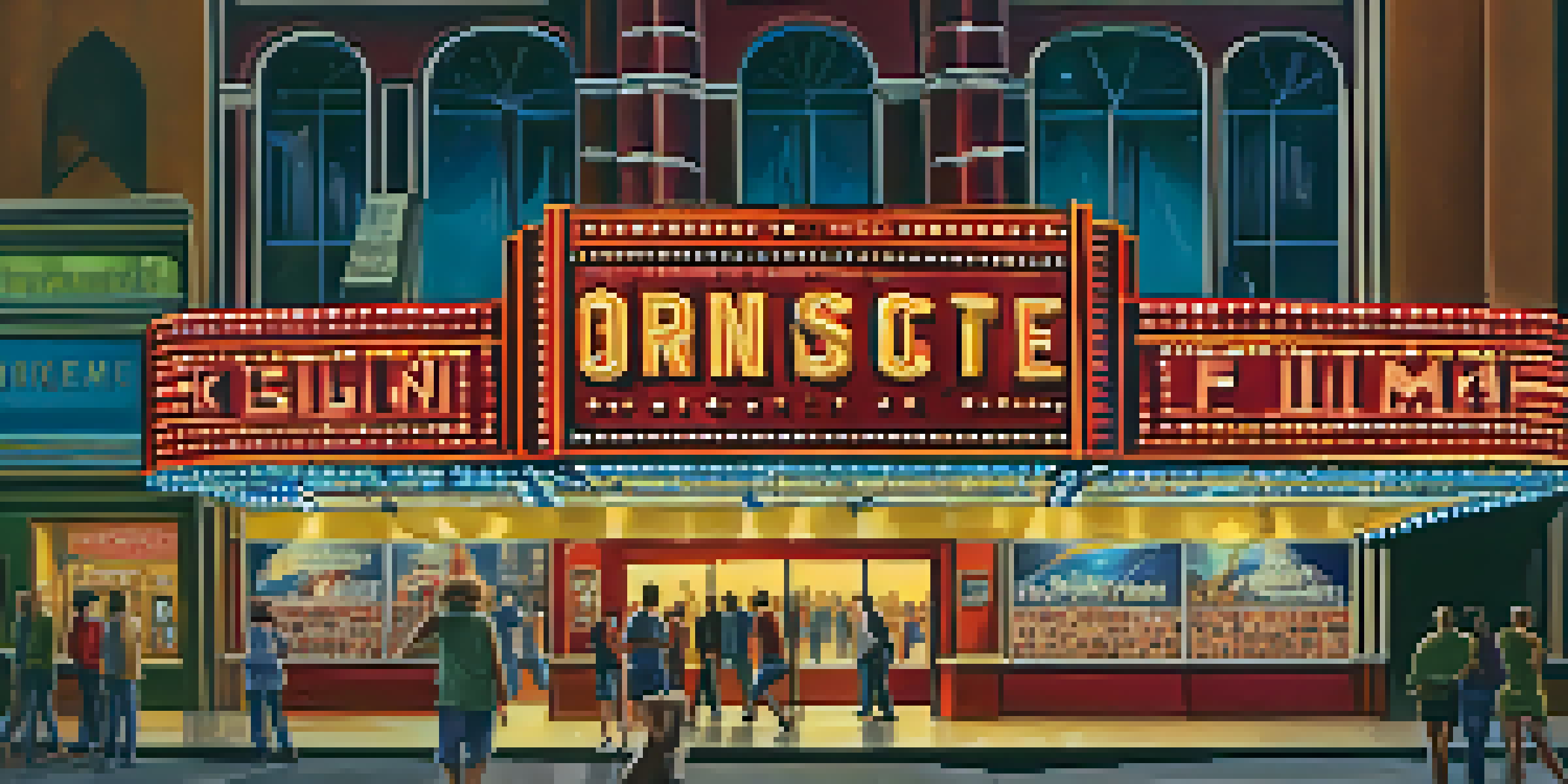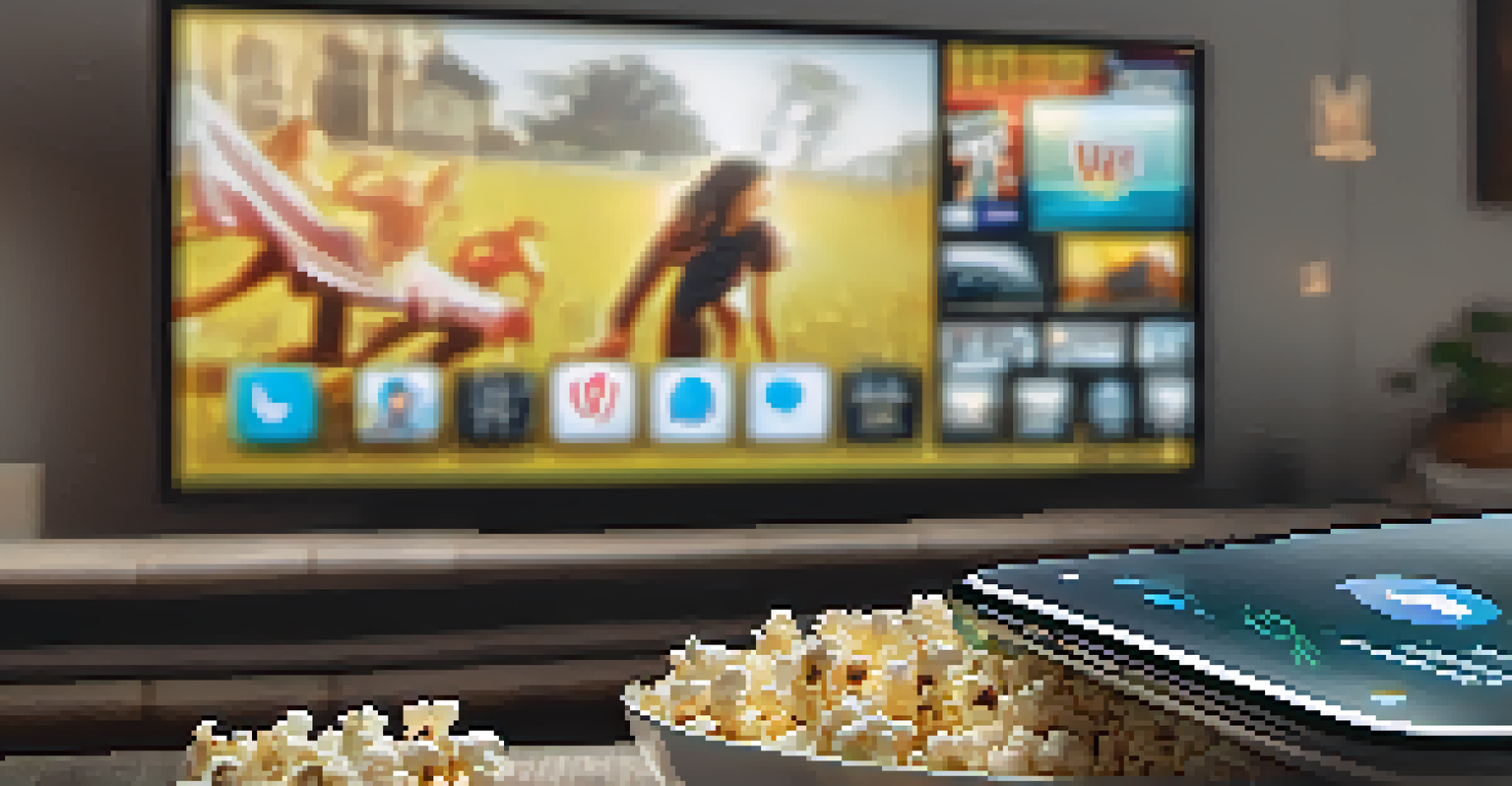The Impact of Social Media on Hollywood Movie Marketing

The Evolution of Movie Marketing in the Digital Age
Gone are the days when movie marketing relied solely on billboards and trailers. The rise of the internet has transformed how films are promoted, making social media a pivotal platform. Today, studios utilize channels like Twitter, Instagram, and TikTok to create buzz and engage audiences directly.
Marketing is no longer about the stuff you make but the stories you tell.
For instance, films like 'Deadpool' and 'It Follows' harnessed social media to cultivate a grassroots following. They tapped into viral marketing strategies, generating excitement that traditional methods often miss. This evolution has led to a more interactive experience between fans and filmmakers.
As viewers increasingly turn to social media for entertainment news, studios have adapted their strategies. They now prioritize digital campaigns, understanding that a single viral tweet or meme can significantly impact box office success.
Building Anticipation with Teasers and Trailers
Teasers and trailers have become essential tools for building anticipation, and social media amplifies their reach. By sharing short clips and sneak peeks on platforms like Instagram and TikTok, studios create excitement well before a film's release. These bite-sized content pieces cater to the short attention spans of audiences today.

For example, the viral success of the 'Avengers: Endgame' trailer showcased how effective social media can be in generating hype. Fans eagerly shared their reactions, creating a ripple effect that drew in millions of views. This phenomenon illustrates how social media transforms traditional marketing tactics.
Social Media Transforms Marketing
The internet has shifted movie marketing from traditional methods to dynamic social media strategies that engage audiences directly.
Moreover, engaging with audiences through comments and shares fosters a sense of community. Fans feel like they’re part of the journey, which strengthens their connection to the film and increases the likelihood of them seeing it in theaters.
Engagement Through Interactive Campaigns
Interactive campaigns are a game changer in movie marketing, and social media is the perfect playground for this. Studios now create polls, quizzes, and challenges that encourage fans to participate actively. Such engagement not only generates excitement but also helps create a more personal connection between audiences and films.
The best marketing doesn't feel like marketing.
Take the 'Star Wars' franchise, for instance. They often launch interactive campaigns that ask fans to choose their favorite characters or moments. This level of involvement makes audiences feel valued and invested in the film's success.
Additionally, these interactive elements often lead to organic sharing as fans showcase their results on their profiles. This word-of-mouth marketing amplifies reach and visibility, reinforcing the film's presence in a crowded marketplace.
Influencer Partnerships: A New Marketing Frontier
Influencer partnerships have emerged as a powerful marketing tool in Hollywood. By collaborating with social media influencers, studios can tap into established fan bases and reach wider audiences. Influencers often have loyal followers who trust their recommendations, making them ideal for promoting films.
For example, a beauty influencer might create makeup looks inspired by a movie character, generating buzz and interest. This kind of authentic promotion resonates with audiences, as it feels more relatable than traditional advertising.
Interactive Engagement Boosts Hype
Interactive campaigns allow fans to actively participate, fostering a deeper connection to films and enhancing promotional efforts.
Moreover, influencers can provide behind-the-scenes content or exclusive interviews, offering fans a unique glimpse into the film's making. This insider perspective not only builds excitement but also reinforces the film's narrative and themes.
The Role of User-Generated Content
User-generated content (UGC) has become a vital aspect of movie marketing. Fans often create their own content, such as fan art or video tributes, which can significantly impact a film's visibility. Studios encourage this creativity by hosting contests or featuring fan content on their official channels.
A great example is the 'Toy Story 4' marketing campaign, which invited fans to share their favorite toy stories. The resulting UGC showcased genuine emotional connections, enhancing the film's brand image and fostering community.
This approach not only amplifies reach but also creates a sense of ownership among fans, making them feel like they are part of the film's journey. As a result, UGC serves as authentic testimonials that can sway potential viewers.
Harnessing the Power of Viral Trends
Viral trends have the potential to catapult a film into the spotlight, and social media is where these trends often originate. Studios closely monitor platforms like TikTok for emerging trends, which they can incorporate into their marketing strategies. A well-timed, relatable meme or challenge can make all the difference in a film's success.
For instance, the 'Shrek' series saw a resurgence in popularity due to viral TikTok trends. Fans recreated iconic scenes, leading to a renewed interest in the franchise. This phenomenon highlights how social media can breathe new life into older films.
Influencers Amplify Film Reach
Collaborating with social media influencers helps studios tap into established fan bases, making promotions feel more relatable and authentic.
By leveraging these trends, studios can reach younger demographics who may not have been familiar with the film otherwise. Embracing viral culture not only increases engagement but also enhances the film's relevance in today’s fast-paced digital landscape.
Measuring Success and Adapting Strategies
The ability to measure success in real-time is one of the greatest advantages of social media marketing. Studios can track engagement metrics, audience sentiments, and conversion rates, allowing them to adjust their strategies on the fly. This adaptability is crucial in a landscape that changes as quickly as social media trends.
For instance, if a particular campaign is underperforming, studios can analyze data to understand why and pivot their approach. This might involve tweaking messaging, changing visuals, or even shifting the target audience.

Ultimately, this data-driven approach ensures that marketing efforts are as effective as possible. By continuously analyzing and refining strategies, studios can maximize their investment and enhance their chances of success at the box office.